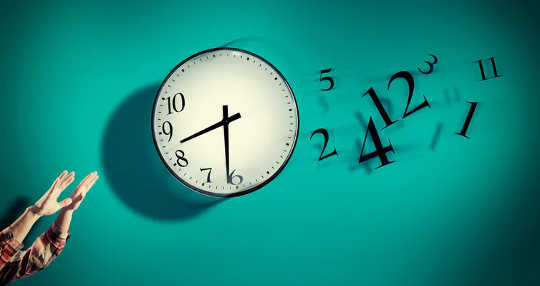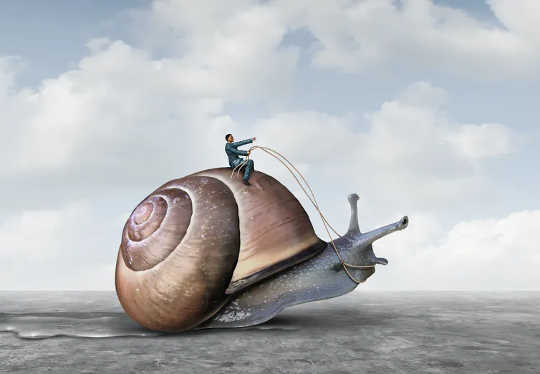Does it feel like 2020 went on forever? Did lockdown drag, and can you even remember how you spent your time when you weren’t living under coronavirus restrictions? You are not alone. For many, 2020 has been the year in which the constancy of time was lost to the upheaval of coronavirus.
Objectively, time passes at a constant, linear rate. Subjectively, however, time waxes and wanes with our activities and emotions. Sometimes, it flies by, other times it drags so slowly that it almost stands still.
This is backed up by research I conducted in April, which explored how the early months of the coronavirus pandemic had affected people’s experiences of the passage of time. Of particular interest was how quickly time felt like it was passing during lockdown in comparison to “normal” (that long-ago time before lockdown).
I surveyed 604 people about how quickly time felt it was passing that day and that week in comparison to before the lockdown. Participants also answered questions about their mood, family life and how busy they were to give context on the factors, which made time more likely to speed up or slow down for different people.
Tempus fugit?
My results showed that there was widespread distortion time during lockdown, with more than 80% of people reporting that time felt like it was passing differently. But lockdown did not distort time in the same way for everyone. Instead, time sped up during lockdown for 40% of people and slowed down for the remaining 40%.
Why was this? My analysis suggests that the perceived speed of time during the day was affected by a person’s age, how satisfied they were with their level of social interaction, how stressed they were and how busy they were. In general, the days passed more quickly for younger people who were socially satisfied, busy and experiencing low levels of stress. Conversely, the day passed more slowly for older people, particularly those over the age of 60, who were socially dissatisfied, stressed and lacking tasks to occupy them.
Similar patterns were observed for the subjective speed of the week. A fast week was associated with being younger and more socially satisfied, whereas a slow week was associated with being older and less socially satisfied.

À la recherche du temps perdu … Alberto Andrei Rosu/Shutterstock
A second unpublished study I conducted in 2020 during the November lockdown revealed that, of the 851 people surveyed, more than 75% experienced distortion to time and 55% reported that the start of the first lockdown felt longer than eight months ago. A slower second lockdown was associated with shielding, dissatisfaction with social interaction and greater depression and boredom.
The UK is not alone in its loss of time during lockdown. Studies conducted in France, Italy and Argentina also show widespread distortion to the passage of time during periods of strict COVID-19 restrictions.
Unlike in the UK, in France and Italy lockdown passed more slowly than normal for most people rather than being split 40/40 as in my April study. As in the UK, however, boredom was an important predictor of time slowing down in Italy and in France. In France, time also passed more slowly with increasing sadness.
Emotions and time
Why does being older, bored, stressed and socially dissatisfied make time pass more slowly? This question is difficult to answer.
Unlike other senses, we don’t have an obvious organ for time. Instead, time is experienced as part of other sensory inputs, such as sight and hearing, and this has made it difficult to identify precisely how the brain processes it.
One possibility is that when we are bored and socially dissatisfied we have lots of spare cognitive capacity and that we then use some of that capacity to increase our monitoring of time. This increased monitoring then results in time passing more slowly than normal, simply because we are more aware of time than normal. Another possibility is that the emotional consequence of lockdown altered the way the brain processes time.
In particular, the negative emotions associated with isolation, boredom, sadness and stress may have contributed to a slowing of time. However, inconsistent effects of depression and anxiety across studies suggests that the effect of emotion on time is complex.

Vaccine ahoy. Lightspring/Shutterstock
So what of 2021? Will time regain its regular rhythm? It is difficult to say. With the first vaccines currently being deployed, we maybe more hopeful than ever that normality is just around the corner. The reality may be that normality is many months away.
Regardless, while we can’t change the actual time it takes for the vaccination programme to be completed, there are some things which we can do to speed up the wait. By keeping busy, minimising stress, engaging in as much face-to-face or online social interaction as we can and by reducing our stress levels, we can help the journey back to normality pass more quickly than normal.
About the Author
Ruth Ogden, Senior Lecturer in Psychology, Liverpool John Moores University
This article is republished from The Conversation under a Creative Commons license. Read the original article.

Books Improving Attitude and Behavior from Amazon's Best Sellers list
"Atomic Habits: An Easy & Proven Way to Build Good Habits & Break Bad Ones"
by James Clear
In this book, James Clear presents a comprehensive guide to building good habits and breaking bad ones. The book includes practical advice and strategies for creating lasting behavior change, based on the latest research in psychology and neuroscience.
Click for more info or to order
"Unf*ck Your Brain: Using Science to Get Over Anxiety, Depression, Anger, Freak-Outs, and Triggers"
by Faith G. Harper, PhD, LPC-S, ACS, ACN
In this book, Dr. Faith Harper offers a guide to understanding and managing common emotional and behavioral issues, including anxiety, depression, and anger. The book includes information on the science behind these issues, as well as practical advice and exercises for coping and healing.
Click for more info or to order
"The Power of Habit: Why We Do What We Do in Life and Business"
by Charles Duhigg
In this book, Charles Duhigg explores the science of habit formation and how habits impact our lives, both personally and professionally. The book includes stories of individuals and organizations who have successfully changed their habits, as well as practical advice for creating lasting behavior change.
Click for more info or to order
"Tiny Habits: The Small Changes That Change Everything"
by BJ Fogg
In this book, BJ Fogg presents a guide to creating lasting behavior change through small, incremental habits. The book includes practical advice and strategies for identifying and implementing tiny habits that can lead to big changes over time.
Click for more info or to order
"The 5 AM Club: Own Your Morning, Elevate Your Life"
by Robin Sharma
In this book, Robin Sharma presents a guide to maximizing your productivity and potential by starting your day early. The book includes practical advice and strategies for creating a morning routine that supports your goals and values, as well as inspiring stories of individuals who have transformed their lives through early rising.


























